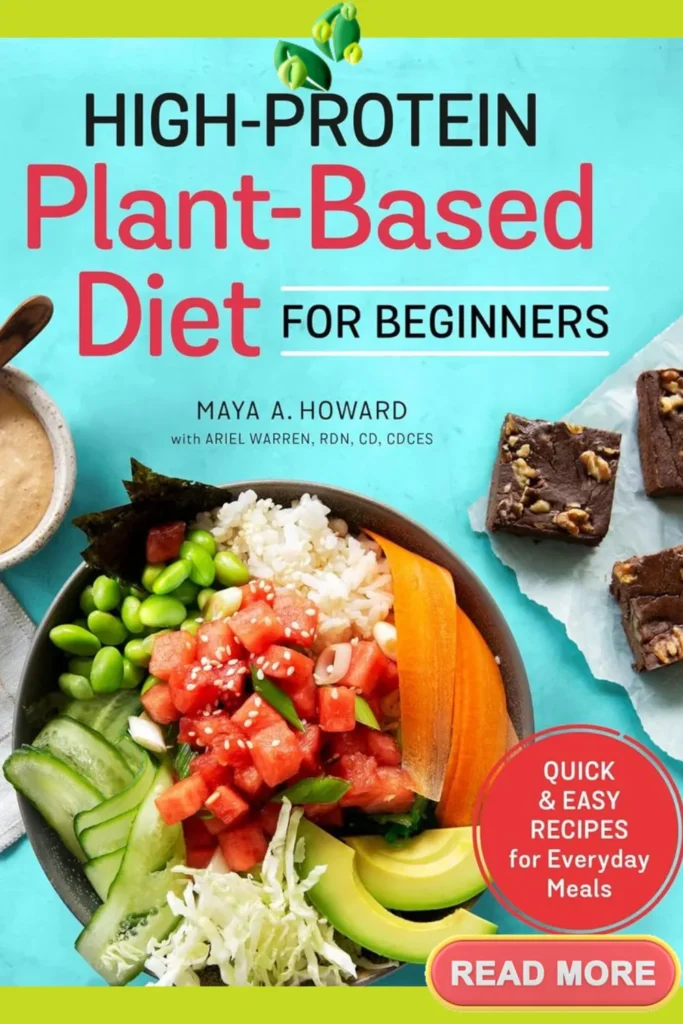In a world where dietary trends come and go, one nutritional truth remains steadfast: protein is essential for our body’s growth, repair, and overall well-being.
But what if you’re committed to a vegetarian lifestyle?
Can you still achieve those high-protein goals without relying on meat? The answer is a resounding yes!
Enter the realm of the High-Protein Vegetarian Diet—a culinary adventure that dispels myths and opens up a treasure trove of plant-based protein sources.
Gone are the days when vegetarians had to worry about skimping on their protein intake.
With an increasing array of delicious and nutrient-dense options available, achieving your health goals while staying true to your vegetarian principles has never been easier.
From versatile legumes and hearty grains to innovative meat substitutes like tempeh and seitan, this guide will explore how you can craft meals that are not only rich in protein but also bursting with flavor.
So grab your apron and get ready to discover how satisfying—and surprisingly simple—a High-Protein Vegetarian Diet can be!
In recent years, the popularity of vegetarian diets has been on the rise, with more and more people choosing to forgo meat in favor of plant-based alternatives.
However, one common concern among individuals considering a vegetarian lifestyle is whether they will be able to meet their protein needs without the inclusion of animal products.
The good news is that a high-protein vegetarian diet is not only possible, but it can also provide all the essential amino acids necessary for optimal health.
By incorporating a variety of protein-rich plant foods into your meals, you can easily meet your daily protein requirements and enjoy a balanced and nutritious diet.
In this article, we will explore the benefits of a high-protein vegetarian diet, as well as provide practical tips on how to maximize your protein intake without relying on meat.
Whether you are looking to reduce your meat consumption for health, ethical, or environmental reasons, following a high-protein vegetarian diet can help you achieve your nutritional goals and support overall well-being.
Table of Contents High-Protein Vegetarian Diet
Opt for plant-based protein sources
Incorporating plant-based protein sources into your diet can significantly contribute to meeting your daily protein requirements, essential for maintaining muscle mass and overall health.
Legumes such as lentils, chickpeas, and black beans are not only rich in protein but also offer a range of essential nutrients like fiber, iron, and potassium.
Nuts and seeds like almonds, chia seeds, and flaxseeds are excellent sources of healthy fats and protein as well.
Additionally, whole grains such as quinoa and buckwheat provide a substantial amount of protein while offering a variety of vitamins and minerals.
By diversifying your protein sources to include plant-based options, you can enhance the nutritional value of your diet and support your health goals effectively.
Include legumes, nuts, and seeds
To optimize your protein intake in a high-protein vegetarian diet, incorporating legumes, nuts, and seeds into your meals can offer a wide range of health benefits.
Legumes are not only excellent sources of protein but also provide essential nutrients such as fiber, iron, and potassium, which are vital for overall health.
Nuts and seeds, including almonds, chia seeds, and flaxseeds, not only contribute to your protein needs but also offer healthy fats that are beneficial for heart health.
By including a variety of these plant-based sources in your meals, you can create a well-rounded diet that supports muscle maintenance, promotes satiety, and enhances your overall nutritional intake.
Incorporate tofu and tempeh dishes
For additional protein options in your high-protein vegetarian diet, consider incorporating tofu and tempeh dishes into your meal plans.
Tofu, made from soybeans, is a versatile ingredient that can be used in a variety of savory and sweet dishes, providing a good source of plant-based protein.
Tempeh, a fermented soy product, offers a nutty flavor and firm texture, making it a great meat alternative in stir-fries, salads, and sandwiches.
Both tofu and tempeh are rich in essential amino acids, making them valuable additions to a vegetarian diet for supporting muscle growth and repair.
Experimenting with different recipes using tofu and tempeh can add diversity to your meals while ensuring you meet your protein requirements in a delicious and nutritious way.
Choose whole grain products
Incorporating whole grain products into your high-protein vegetarian diet can provide essential nutrients and dietary fiber necessary for overall health.
Whole grains such as quinoa, brown rice, whole wheat pasta, and oats offer a rich source of complex carbohydrates that can sustain energy levels throughout the day.
In addition, these whole grains contain important vitamins, minerals, and antioxidants that support proper bodily functions and help reduce the risk of chronic diseases.
By selecting whole grain options over refined grains, you can promote better digestion, maintain stable blood sugar levels, and contribute to a balanced diet that aligns with your high-protein vegetarian lifestyle.
Experiment with quinoa and bulgur
To enhance the variety and nutritional content of your high-protein vegetarian diet, consider experimenting with versatile whole grains such as quinoa and bulgur.
Quinoa is a complete protein source, containing all nine essential amino acids, making it an ideal option for vegetarians looking to meet their protein needs.
Furthermore, quinoa is rich in fiber, iron, and magnesium, providing essential nutrients to support overall health.
On the other hand, bulgur, a form of cracked wheat, offers a hearty texture and nutty flavor that can add depth to salads, pilafs, and vegetarian burgers.
High in fiber and protein, bulgur can help you feel full and satisfied while contributing to a balanced and nutritious diet.
By incorporating these whole grains into your meals, you can elevate the taste and nutritional profile of your high-protein vegetarian dishes.
Blend protein-rich smoothies and shakes
Blend protein-rich smoothies and shakes can serve as a convenient and delicious way to increase your daily protein intake while following a high-protein vegetarian diet.
By incorporating ingredients such as plant-based protein powders, Greek yogurt, nut butter, or chia seeds into your smoothies, you can create a satisfying and nutrient-dense beverage that can be enjoyed as a snack or a meal replacement.
Additionally, adding ingredients like spinach, kale, and fruits can provide a range of essential vitamins, minerals, and antioxidants to support overall health.
Experimenting with different flavor combinations and textures allows you to customize your smoothies to suit your preferences and nutritional needs, making them a versatile and enjoyable addition to your high-protein vegetarian meal plan.
Snack on Greek yogurt, hummus
To further elevate the protein content in your high-protein vegetarian diet, incorporating snacks like Greek yogurt and hummus can offer not only a tasty treat but also a significant protein boost.
Greek yogurt is renowned for its high protein content, making it an excellent snack option to help keep you full and satisfied between meals.
Additionally, hummus, made from protein-rich chickpeas, provides a flavorful and nutrient-dense dip that pairs well with crunchy vegetables or whole-grain crackers.
These protein-packed snacks not only contribute to meeting your daily protein requirements but also offer a range of essential nutrients that support overall health and well-being, making them valuable additions to a balanced vegetarian eating plan.
Ensure a balanced diet always
Maintaining a balanced diet consistently is essential for sustaining optimal health and well-being while following a high-protein vegetarian diet.
By ensuring a variety of nutrient-dense foods are included in your meals, you can meet your daily nutritional needs efficiently.
Consuming a diverse range of fruits, vegetables, whole grains, legumes, nuts, and seeds allows you to obtain essential vitamins, minerals, fiber, and antioxidants vital for supporting overall health.
Additionally, incorporating adequate amounts of protein sources such as tofu, tempeh, lentils, and quinoa in your daily meals can help maintain muscle mass and promote satiety, aiding in weight management.
Prioritizing a balanced diet rich in essential nutrients ensures you’re not only meeting your protein requirements but also fostering a foundation for long-term health and vitality.
In conclusion, adopting a high-protein vegetarian diet offers a multitude of health benefits, serving as a viable alternative to traditional protein sources.
By incorporating a variety of plant-based proteins such as legumes, nuts, seeds, and whole grains, individuals can effectively meet their daily protein requirements while also reaping the advantages of a diet rich in vitamins, minerals, and antioxidants.
Embracing this dietary approach not only supports overall well-being but also contributes to environmental sustainability, making it a desirable option for those seeking a nutritious and ethical lifestyle.
Remember to consult with a healthcare provider or nutritionist to ensure a balanced and personalized dietary plan that meets individual nutritional needs.
FAQ
What are some of the best sources of protein for vegetarians following a high-protein diet?
Some of the best sources of protein for vegetarians following a high-protein diet include tofu, tempeh, seitan, legumes (such as lentils, chickpeas, and black beans), quinoa, nuts and seeds (like almonds, chia seeds, and hemp seeds), edamame, Greek yogurt, and plant-based protein powders (such as pea protein or soy protein).
Incorporating a variety of these sources can help ensure that vegetarians meet their protein needs while following a high-protein diet.
How can vegetarians ensure they are getting enough essential amino acids on a high-protein diet?
Vegetarians can ensure they are getting enough essential amino acids on a high-protein diet by combining different plant-based protein sources such as beans, lentils, quinoa, tofu, and nuts to create complete protein profiles.
Incorporating a variety of protein-rich foods throughout the day can help ensure they are meeting their essential amino acid needs.
Additionally, consuming fortified plant-based protein sources or supplements can provide an extra boost of essential amino acids to support overall protein intake.
Are there any potential drawbacks or risks associated with following a high-protein vegetarian diet?
While a high-protein vegetarian diet can offer numerous health benefits, there are potential drawbacks and risks to consider.
These may include nutrient deficiencies, excessive saturated fat intake from certain protein sources, and an increased risk of kidney issues due to high protein consumption.
It is important to ensure a well-balanced diet with a variety of protein sources and to consult with a healthcare provider or nutritionist to address any specific concerns or risks associated with a high-protein vegetarian diet.
What are some meal planning tips for vegetarians looking to increase their protein intake?
Some meal planning tips for vegetarians looking to increase their protein intake include incorporating protein-rich foods like tofu, tempeh, lentils, chickpeas, quinoa, nuts, and seeds into meals; planning balanced meals with a variety of protein sources; preparing meals in advance to ensure protein-rich options are readily available; and considering protein supplements like pea protein or soy protein powders if needed to meet daily requirements.
Incorporating these strategies can help vegetarians increase their protein intake and maintain a well-balanced diet.
How does a high-protein vegetarian diet compare to a traditional high-protein diet that includes meat and animal products?
A high-protein vegetarian diet can be just as effective as a traditional high-protein diet that includes meat and animal products in terms of meeting protein needs and supporting muscle growth.
Plant-based protein sources like legumes, tofu, quinoa, and nuts can provide all essential amino acids.
Additionally, a vegetarian diet can offer other health benefits such as lower saturated fat intake and higher fiber content.
However, careful planning is necessary to ensure adequate intake of essential nutrients such as iron, zinc, and vitamin B12 that are more abundant in animal products.

